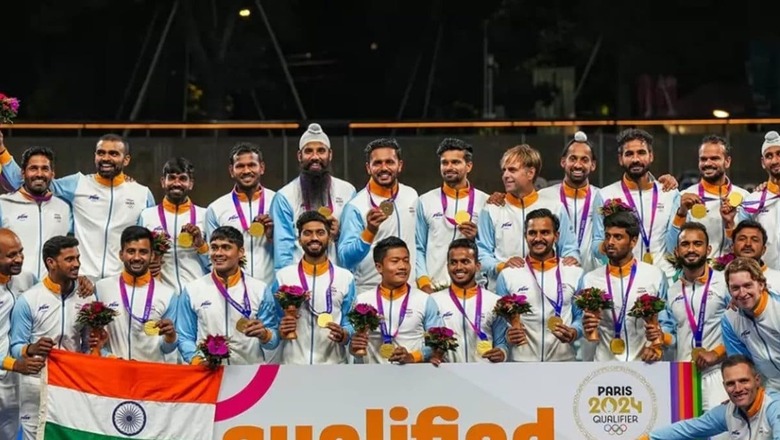
views
The Indian contingent created history as they crossed the 100-medal tally for the first time and secured a third-best finish in the 2023 Asian Games.
India, with a record haul of 107 medals at the Hangzhou Asian Games, has written a glittering chapter in the country’s sporting history, while also giving a strong reason to start dreaming about a best-ever Olympic performance next year in Paris.
The 660 athlete-strong contingent bagged 28 gold, 38 silver, and 41 bronze at the continental showpiece.
The medals were distributed across various sports disciplines: 9 in archery, 29 in athletics, 22 in shooting, 2 in badminton, 5 in boxing, 1 in bridge, 1 in canoeing, 2 in cricket, 2 in horse riding, 1 in golf, 1 in hockey, 2 in roller skating, 5 in rowing, 3 in sailing, 1 in sepak takraw, 5 in squash, 1 in table tennis, 2 in tennis, 5 in wrestling, 1 in wushu, and 1 in kabaddi.
This achievement represents a remarkable evolution in India’s performance on the Asian Games stage. Just two decades ago, in 2002 at the Busan Asian Games, India had secured a modest 36 medals. However, the nation’s commitment to sports and its athletes has steadily driven improvement. By 2006, during the Doha Games, India’s medal count had surged to 53, and it further climbed to 65 medals in 2010 at the Guangzhou Games. There was a slight dip in 2014 at the Incheon Asiad, where India acquired 57 medals.
Nevertheless, India made a triumphant comeback at Jakarta and Palembang five years ago, achieving a record-breaking tally of 70 medals, marking their best-ever performance at that time.
This momentous achievement marks the first time that India has crossed the 100-medal mark at the Asian Games. It is a significant milestone, particularly considering that India had the honour of hosting the inaugural Asian Games in 1951 in Delhi and was second only to Japan then.
India’s fourth-place finish in this year’s Asian Games is also a huge sign of improvement, as this was India’s all-time third-best finish after the second and third-place finishes in 1951 and 1962 respectively.
The Indian contingent and certain officials in the IOC had their apprehensions about India achieving the historic 100-medal mark before the Games began. But to everyone’s surprise, the medals started coming in from day one onwards.
India made massive leaps in various disciplines in this Asiad campaign. A resurgence in the new wave of Indian athletes and shooters was the main focus throughout this Asian Games for India.
Athletics and shooting contributed the maximum number of medals (29 and 22 respectively) making up nearly half of India’s total and gold count.
Shooting gave the most gold medals — seven — while athletics contributed six.
The shooting contingent of India fired a clear warning shot to the rest of the contingencies in the competition as they hit the bullseye to steer themselves to a best-ever total of 29 medals which consisted of seven gold, nine silver, and six bronze.
Various shooters such as the likes of Sift Kaur Samra, Palak Gulia, Esha Singh, and Manu Bhaker made headlines with their stellar performances throughout the events.
But, one name that echoed the loudest was that of Aishwary Pratap Singh Tomar.
Aishwary Pratap Singh Tomar became India’s most successful shooter at the Games with four medals — gold in men’s 10m air rifle and 50m rifle 3P team events and silver and bronze in individual 50m rifle 3P and 10m air rifle.
India witnessed a new breed of track-and-field athletes take centre stage and bring glory this year.
Avinash Sable (men’s 3000m steeplechase), Annu Rani (women’s javelin throw), and Parul Chaudhary (women’s 5000m) won India’s first gold medals in their respective events at the Games, while the men’s 4x400m relay team won the yellow metal for the first time after 61 years.
Another sporting discipline that rose and stood out from the rest was archery.
Archery gave nine medals, including five gold, in a huge improvement after just two silver in the 2018 edition. This was India’s best show in archery in any edition of the Asian Games.
India’s compound archers swept all the five gold medals on offer in a memorable show. Compound archers Jyothi Surekha Vennam and Ojas Pravin Deotale won three gold medals each, the most yellow metal among the Indians in any sport.
India also won its first canoe medal in 29 years while the newly-added sport of e-sports did not yield any medal.
Yet another avenue of sport that India made advances into was that of equestrian, where the quartet of Sudipti Hajela, Divyakriti Singh, Vipul Hriday Chheda and Anush Agarwalla won the first-ever dressage gold.
Then came the expected bastions of Indian sport, who delivered just as expected and brought home the silverware without fail.
Olympic champion Neeraj Chopra’s global presence seems to have rubbed off on the entire contingent, and while he led the charge in athletics there is no denying that the javelin exponent was a motivation for athletes in other disciplines as well.
Chopra went on to secure an easy gold in a controversy-marred javelin component, along with his Indian counterpart Kishore Jena who brought home the silver in the same as well.
Boxer Lovlina Borgohain, after her world championships success in Delhi, finished second best at the Asiads and still secured the silver for India.
The Indian men’s hockey team dominated the tournament and clinched a deserving gold to qualify for the 2024 Olympics. The Indian women’s hockey team, though, settled for a bronze after losing to hosts China 0-4 in the semifinals.
In tennis, more history was made as Rohan Bopanna and Rutuja Bhosale also won the tennis mixed doubles gold.
India also swept the gold medals on offer in cricket and kabaddi, while squash also gave India two more gold medals.
Of course, there were a few disappointments along the way — the biggest being 65kg wrestler Bajrang Punia failing to find any success on the mat — but they were just a few sour notes in the success story scripted by the young Indian athletes.
The bigger story here is how this success can provide the Indian contingent enough momentum to carry onward into the upcoming 2024 Paris Olympics.
India’s unprecedented success in Hangzhou this year followed their best-ever medal haul at the 2020 Tokyo Olympics, and by that yardstick, the country’s athletes can be expected to hit double-medal count in 2024 Paris. One can hope that India’s remarkable journey in sports continues to inspire, and with continued support and dedication, the nation is set to achieve even greater heights in the world of sports.



















Comments
0 comment